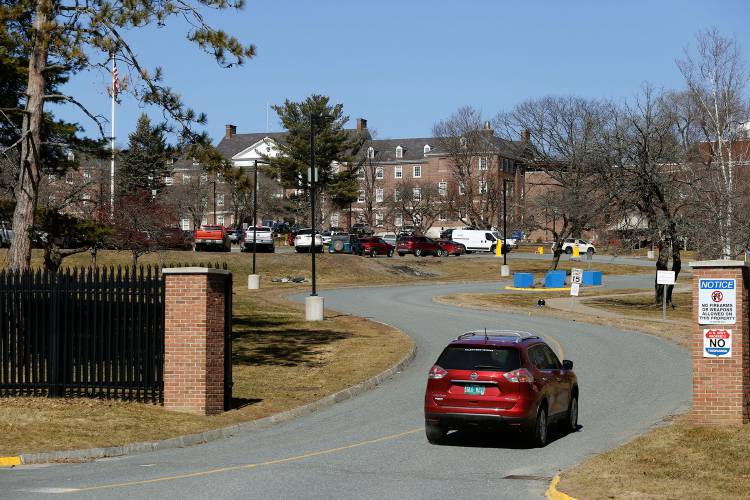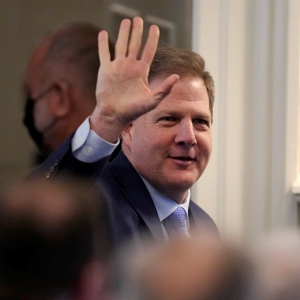Federal agencies with Upper Valley reach among those on the chopping block

The White River Junction VA Medical Center in White River Junction, Vt., on March 16, 2020. (Valley News - Geoff Hansen) Copyright Valley News. May not be reprinted or used online without permission. Send requests to permission@vnews.com. Geoff Hansen
| Published: 02-20-2025 7:31 PM |
WHITE RIVER JUNCTION — The impact of President Donald Trump’s executive orders in the Upper Valley remains unclear, even as federal agencies with institutions in the region face funding and staff cuts.
The Department of Veterans Affairs dismissed more than 1,000 employees nationwide last week.
The layoffs are part of the Trump administration’s initiatives aimed at increasing efficiency in the federal government. Billionaire Elon Musk is heading the efforts with the Department of Government Efficiency, or DOGE.
It’s not clear whether employees in the Upper Valley have been part of the culling. And if so, how many.
Lynne Davis, a spokesperson for the White River Junction VA Medical Center, said she had “no information to share” on whether any employees at the local VA lost their jobs.
Nationally, the federal workers dismissed include non-bargaining probationary employees not including those in “mission-critical positions,” according to a Feb. 13 VA news release. “The personnel moves will save the department more than $98 million per year, and VA will redirect all of those resources back toward health care, benefits and services for VA beneficiaries,” the news release said.
White River Junction VA serves between 25,000 and 28,000 veterans per year, Davis said. Veterans served reside in both Vermont and New Hampshire.
“There is no way that these layoffs will not negatively impact the veterans of our country in terms of the health care and benefits they receive,” U.S. Sen. Bernie Sanders, I-Vt., wrote in a letter to VA Secretary Doug Collins on Tuesday.
Article continues after...
Yesterday's Most Read Articles
 Upper Valley donut maven Muriel Maville dies at 87
Upper Valley donut maven Muriel Maville dies at 87
 Hartford man dies while incarcerated
Hartford man dies while incarcerated
 Hartford hires its first housing and development specialist
Hartford hires its first housing and development specialist
 Upper Valley residents turn out in droves for protests against federal policies and cuts
Upper Valley residents turn out in droves for protests against federal policies and cuts
 After four decades collecting carts, Ricky Tewksbury will retire when Shaw’s closes mid-April
After four decades collecting carts, Ricky Tewksbury will retire when Shaw’s closes mid-April
The U.S. Agency for International Development, the U.S. Forest Service and the National Parks Service have also experienced cuts over the past month.
“The Trump administration is treating our federal workforce as if they are the enemy,” U.S. Rep. Becca Balint, D-Vt., said on the House floor on Feb. 6. “These are regular Americans who work important jobs all over the country, not just in D.C. but in all of our districts.”
The federal government employs more than 8,000 Vermonters and close to 19,000 New Hampshire residents, according to a report from the Congressional Research Service.
This week, the Trump administration fired about 1,000 National Park employees and 2,000 probationary, non-firefighting employees from the Forest Service.
The Upper Valley is home to Marsh-Billings-Rockefeller National Historical Park in Woodstock and Saint-Gaudens National Historical Park in Cornish. Also nearby are the White Mountain and Green Mountain national forests.
Spokespeople from the parks and the national forest service declined to comment on whether any employees at the local parks or national forest have lost their jobs.
At a news conference on Feb. 7, Trump said the Department of Education and the military are next on the chopping block.
The U.S. Army Cold Regions Research and Engineering Laboratory, or CRREL, headquartered in Hanover, employs more than 250 engineers, scientists, technicians and support personnel, according to its website.
CRREL employees’ research aims to “address current and emerging technical challenges related to cold regions.”
CRREL spokesperson Justin Campfield did not respond to a request for information on whether CRREL has experienced layoffs.
Earlier this month, the Trump administration announced a 15% rate cap on National Institutes of Health grants for indirect costs. Indirect costs include administration, building maintenance and utilities.
The current negotiated rate for indirect funding is 55% at Dartmouth Health and 64% at Dartmouth College.
It is still up in the air whether the cap will hold up in court. A Massachusetts judge put a freeze on the order and a hearing has been scheduled in the U.S. District Court for Massachusetts on Friday.
Should the cap go into effect, hundreds of Upper Valley workers could be affected.
The Dartmouth Health system has about 400 employees whose jobs are funded at least in part by a federal grant, Steven Bernstein, chief research officer at Dartmouth Hitchcock Medical Center, said at a news conference last Friday.
“In New Hampshire, that’s a lot of people,” he said.
At Dartmouth College, there are about 900 employees funded by NIH grants, spokesperson Jana Barnello said.
“We’re not discussing layoffs or any changes in employment right now,” Dean Madden, Dartmouth’s vice provost for research, said at the news conference. “We will really try to avoid that in the long term.”
In late January, the Trump administration announced a freeze on most federal grants and loans. A few days later it rescinded the freeze, but some individual funding streams continue to be paused, creating uncertainly for municipalities.
In a meeting Wednesday, the Lebanon City Council and Deputy City Manager David Brooks discussed how the uncertainty around federal funding will impact the city. The Council also unanimously approved a resolution objecting to the pause and planned to reach out to other local leaders to expand the resolution to cover other municipalities.
“We’re all going to be impacted by this, I can’t imagine a city or town out there that doesn’t have some federal funding flowing into it,” Mayor Tim McNamara said at the meeting.
Brooks outlined over $30 million in funds that are uncertain, at risk or have been confirmed to be frozen in the city. He also clarified that the list was not comprehensive. Included in the at-risk funds is what may amount to more than $3 million in reimbursements and tax credits for money that has already been spent.
Paused Lebanon projects include the installation of one to two planned electric vehicle chargers and an initiative to plant 200 trees along public roads and open spaces to offset the heat radiated by pavement.
But, the list of uncertain funding was much longer and the “big concern,” Brooks said.
Also potentially on the chopping block is $16 million in federal funds to make improvements to the bridge connecting South Main Street to Route 12A.
The city could also lose “well over” $12 million for projects at the Lebanon Municipal Airport and about $1.5 million for a proposed childcare center, Brooks said.
“Federal dollars matter enormously to our way of life here in New Hampshire and we are in a fight to protect dollars that have been promised to our state,” U.S. Rep. Maggie Goodlander, D-N.H., said in an interview with the Valley News on Thursday after meeting with Dartmouth Health employees to talk about their concerns over health care costs and the uncertainty of federal funding.
Goodlander said she is “closely following” court cases challenging Trump’s orders.
“I’m making the case for a commonsense approach,” she said.
Emma Roth-Wells can be reached at erothwells@vnews.com or 603-727-3242. Valley News Staff Writer Clare Shanahan contributed to this report.






 Lyme family anxious as town considers selling rental property
Lyme family anxious as town considers selling rental property Sununu says he’s not running for US Senate
Sununu says he’s not running for US Senate 
